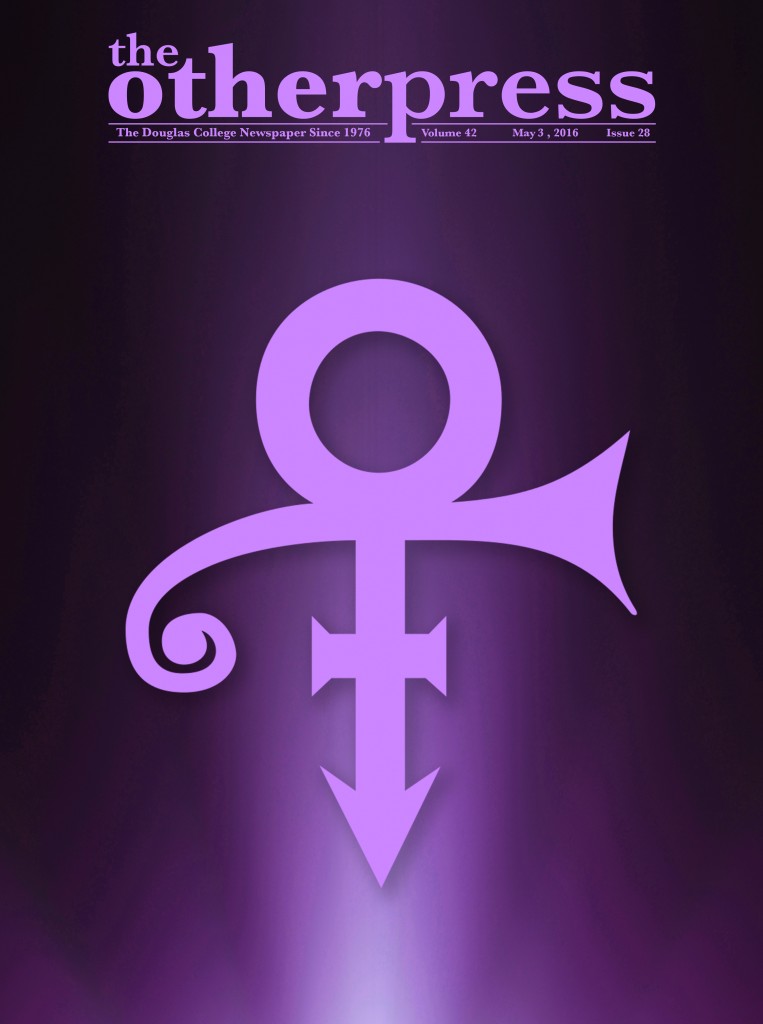
In Memory of Prince
By Adam Tatelman, Arts Editor
A tribute known as “The Court” is making rounds on the Internet in the wake of Prince’s passing, paying homage to Michael Jackson, Freddie Mercury, David Bowie, Robin Williams, and—of course—Prince Rogers Nelson himself. It acknowledges the void left in the wake of yesteryear’s greatest live entertainers by their collective passing: the King, the Queen, the Duke, the Jester, and the Prince.
It is a sombre tribute, because it carries with it the implicit knowledge that other titans of performance will fall, and soon. Though we have not lost them yet, greats like Keith Richards, Paul McCartney, and Elton John cannot be long for this world, and we may not see the likes of them again in our lifetimes. However, there is a life-affirming truth that these artists’ works will survive them, and will go on to inspire a new generation of musicians.
When reviewing Prince’s life, perhaps the only thing we can discuss is his work. Despite his incredible fame, he did not choose to live his private life publicly in the way many famous people do. Rather than becoming a performer for the paparazzi, Prince elected to live a very low-key life off the stage. Unlike so many other stars, Prince has never been accused of public misconduct, sex scandals, or drug addiction. His fame was a result of his music and talent, not notoriety.
Though there is no doubt that sex and drugs were involved in his career—he was famous in the ’80s, after all—everything seems to suggest that Prince always kept his indulgences to a tasteful minimum. That’s one of the most important things that sets him apart from other famous musicians of his time.
Both of Prince’s parents were musically talented. His mother, Mattie Della Shaw, was an accomplished jazz singer, and his father, John Lewis Nelson, was a pianist who fronted a musical group called the Prince Rogers Trio. Clearly, music was an essential part of Prince’s life since the beginning, but this harmony was not to last. Nelson and Della divorced, leaving Prince with a stepfather, Hayward Baker. Like many other 10-year-olds, Prince struggled to connect with his s stepfather, but it was Baker who gave him the opportunity to see James Brown, the Godfather of Soul, in concert, providing him with an idol he desperately needed.
It was this influence and his connection to the musical world that led Prince to an early mastery of several instruments, including the guitar left to him by his father. He became a musical maestro of sorts, mastering 27 different instruments by the time he was 20 years old. He himself recorded most of the instruments for his first five albums, and popular opinion still holds that he played every single one in “For You,” his debut album.
Fittingly, Prince’s image was distinctive yet ever-evolving one. He both absorbed and exuded style, taking influence from every popular musical form of the time. While synthesizing elements of power pop, R&B, funk, rock, psychedelia, and even soul music, he ensured that each hit was at once familiar and different, never content with stylistic stagnation. Few know, for instance, that Prince wrote the gothic soundtrack to Tim Burton’s brooding 1989 Batman film, merely because it seems so far outside his artistic prerogative, but, just like his vocal range, no stylistic note was too high for him to reach.
After selling 100 million records, winning seven Grammy awards, and joining the Rock and Roll hall of fame, Prince seared himself onto celluloid with the semi-autobiographical 1984 hit Purple Rain. Although it was received with all the critical tepidity of a grand and indifferent shrug, his fans the world over went wild for the film’s iconic soundtrack and heightened interpretation of Prince’s younger years. Celebrated critic Roger Ebert hailed it as “the greatest rock film since Pink Floyd’s The Wall.”
Prince’s subsequent film efforts—Under the Cherry Moon, Sign o’ the Times, and Graffiti Bridge—earned spots on Ebert’s “worst of the year” lists, ultimately failing to recapture the audience-pleasing magic of Purple Rain. However, Prince maintained a steady output of records, always controversial for their unambiguously erotic lyrics.
If there was a great battle in Prince’s lifetime, it was his conflict with Warner Bros. Studios. After the success of his album Diamonds and Pearls, WB Studios offered him $100 million to produce six more albums with them, with the caveat that each will sell five million units or more. At that time, it was the most lucrative contract WB had ever offered to any artist. Unfortunately, the contract stipulated that WB would retain ownership of all master recordings made by Prince from 1978 until the termination of the contract.
Prince was unsatisfied with these terms, but he accepted the contract in order to fund the upkeep of his personal recording studio in Paisley without going bankrupt. At odds with WB over restrictions on album production and concert performances, Prince actually retired from recording, choosing instead to finish the albums with unreleased songs from his personal collection—over 500 of them. Extending a final middle finger to WB, Prince refused to publish any more music under his given name, instead identifying himself and his albums with an unpronounceable symbol.
Dubbed by the public “The Artist Formerly Known as Prince,” he endured a great deal of scrutiny from displeased fans, as well as WB itself. As promised, he went on to complete the conditions of his contract using his unpublished materials, all the while writing new music that he intended to save for the aftermath of his association with WB. He released a great deal of it in Emancipation, an album he produced on much more cordial terms with EMI Records in 1996, just before they went bankrupt. Not long afterwards, he finally reclaimed the name “Prince,” and his distaste for record labels went down in history.
“He was a huge inspiration to a whole generation of musicians,” commented celebrated Canadian composer Robert Buckley during his visit to Douglas College. “He’s really taken a stand on the pirating and exploitation of his music. He said no to iTunes. He remained in control of his music. Unfortunately, that might disappear now that he’s gone, but that was a brave thing to do. He’s the one that stood his ground.”
Sadly, Buckley’s fears may not be unfounded. A great many things have remained uncertain since Prince’s untimely death, including the lack of a will to determine which of his siblings will receive how much of his estate. As with any celebrity death, this case is a series of lawsuits waiting to happen, even taking into account the appointing of Bremer Trust to oversee his estate. Hopefully, Prince’s legacy will not be followed by a vicious legal bout of sibling infighting.
Indeed, it seems as though tabloid media is attempting to make up for the lost time, trying to implicate Prince as a drug addict based on the extremely circumstantial evidence of Percocet use prior to his death—given Prince’s recent struggle with illness and a weakening immune system, it is not surprising that he was on pain medication. Although the autopsy report has not been released at the time of this writing, police have ruled out suicide as a cause of death.
Death is always sudden, even to those who expect it. The lack of a will makes that much clear. But after death always comes remembrance; acknowledgement that, yes, one man reached the peak of his own musical talent, leaving behind him the indelible marks of the climb that lead up to his passing. We must always remember that, as long as we leave something worthwhile behind us, death does not have to mean the end for our life’s work. It is Prince’s art that defines his life, and that is worth remembering.



